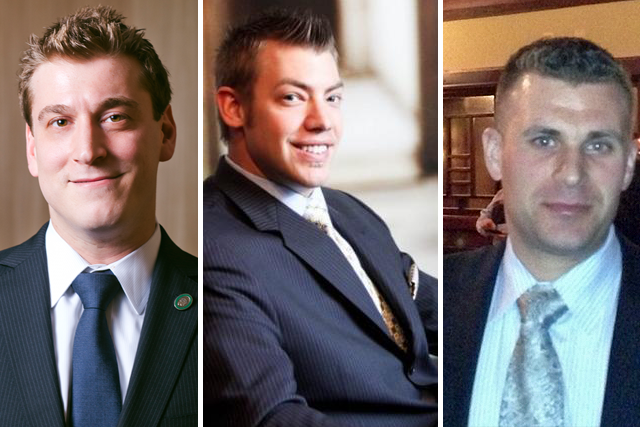[UPDATE] Can These Chicago Sommeliers Pass The Master Test?
By John Lenart in Food on Feb 27, 2015 4:30PM

Richard Hanauer (photo by Anjali Pinto), Dan Pilkey (photo courtesy of Isabelli Media Relations), Blake Leja (photo courtesy Blake Leja)
[UPDATE, 2/28/2015, 3:30 p.m.: Since the publishing of the original post it has come to our attention that three other Chicago wine industry professionals are also taking the MS Theory exam this weekend. They include Michael Matonte of Vin Chicago, Parag Lalit a long time wine industry pro who recently relocated to Chicago with his wife and James Bube of Heritage Wine Cellars who is also a 2015 Top Somm Regional finalist. We apologize for this oversight and wish all candidates the best of luck.]
If you’ve seen the documentary Somm, you’re familiar with what it means to become a Master Sommelier. If you haven’t seen it, a Master Sommelier is the highest diploma offered by The Court of Master Sommeliers. According to its website, “The Court of Master Sommeliers was established to encourage improved standards of beverage knowledge and service in hotels and restaurants. Education was then, and remains today, the Court's charter. The first successful Master Sommelier examination was held in the United Kingdom in 1969. By April 1977, the Court of Master Sommeliers was established as the premier international examining body.”
Since its inception only 219 people have passed the Master Sommelier exam.
This weekend three Chicago wine industry professionals will head to Dallas to begin the first leg in pursuit of their Master Sommelier diplomas. Dan Pilkey formerly of Sixteen, Richard Hanauer of RPM Steak and Blake Leja of Signature Fine Wines will be taking the theory portion of the three part exam this weekend. If they pass this daunting test they move onto the practical and tasting portions of the exam held in May.
The Court of Master Sommeliers offers four levels of certifications for wine professionals. The pinnacle of these is Master Sommelier. This exam is considered one of the toughest exams anywhere. It has three parts:
Theory, which is an oral exam in which candidates must command the following:
- Know the principal grape varieties used in wine making and the areas of the world where they are cultivated.
- Answer questions on international wine laws, including the European Community, United States, Australia and other global wine regions.
- Display knowledge of fortified wines, their vinification, storage and handling.
- Describe the various methods of distillation and the making of spirits and liqueurs, as well as the process of making beers and ciders and the reasons for the variations in style between different products.
- Knowledge of cigar production, with special reference to Havanas, will be required.
- Discuss how the products should be properly stored to ensure that they remain in the optimum condition.
Next there is a practical service exam where candidates must:
- Discuss, recommend and serve aperitifs, displaying a thorough knowledge of their ingredients and production methods as well as the ability to serve them correctly.
- Select, prepare and position glassware necessary for the service of all beverages in the lounge, restaurant, or private function room.
- Discuss menu content and wine list, recommending wines to accompany a wide range of foods; displaying a sound knowledge of the products, their vintages and characteristics.
- Present, offer, prepare (decanting when necessary), and serve wines, demonstrating a high degree of efficiency and proficiency.
- Present, offer, prepare and serve brandies, liqueurs and other spirits, including knowledge of the proper serving portions for each.
- Handle questions and complaints with skill, elegance and diplomacy.
And finally there is a blind tasting exam. The tasting examination is scored on the candidate's verbal abilities to clearly and accurately describe six different wines. Within twenty-five minutes, he or she must identify grape varieties, country of origin, district and appellation and vintages.
I spoke with each candidate about how they feel going into the exam.
Hanauer: “Going into the exam is terrifying, but also a great sense of warmth and accomplishment. Regardless of pass or fail, I feel like there is a continued desire to succeed, and once the process begins nothing can keep that from me. I would be feeling terrible if this was a one and only shot, but it’s not. It's about trying and learning until you pass, and I feel awesome about being on that pass.”
Leja: “Overall, I don’t really want to say I feel good or bad, I feel that no matter the outcome, I am a better sommelier in the end and I know deep down that I did everything I possibly could to prepare for this exam. If I pass, I pass, and if not, then I will continue to further my studies and hone my theoretical knowledge of wine. My wife Desiree has been the biggest supporter of this process for me and I would definitely like to make her day but in the end I know regardless of the outcome she will still be there for me.”
Pilkey: “I feel confident but most of all I’m ready to get this going.”
After sitting for the exam the trio will have to wait until Monday evening for their results.
Who will pass? Check back here on Tuesday for details.